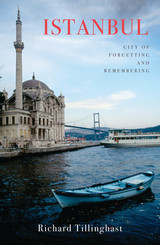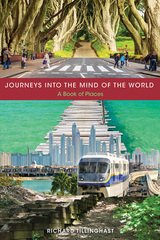

Istanbul was known in Byzantine times as the “Queen of Cities” and to the Ottoman Turks as the “Abode of Felicity.” Steeped in Istanbul’s history, Tillinghast takes his readers on a voyage of discovery through this storied cultural hub, and he is as comfortable talking about Byzantine mosaics and dervish ceremonies as Iznik ceramics and the imperial mosques. His lyrical writing brings Istanbul alive on the page as he accompanies readers to cafés, palaces, and taverns, perfectly conjuring the atmospheric delights, sounds, and senses of the city. Illuminating Istanbul’s great buildings with tales that bring Ottoman and Byzantine history to life, Tillinghast is adept at discovering both what the city remembers and what it chooses to forget.

Renowned poet Richard Tillinghast’s wanderlust and restless spirit are nearly as well known as his verses. This book of essays captures that penchant to wander, yet Journeys into the Mind of the World is not merely a compilation of travel stories—it is a book of places. It explores these chosen locations—Ireland, England, India, the Middle East, Tennessee, Hawaii—in a deeper way than would be typical of travel literature, attempting to enter not just the world, but “the mind of the world”—the roots and history of places, their political and cultural history, spiritual, artistic, architectural, and ethnic dimensions.
Behind each essay is the presence, curiosity, and intelligence of the author himself, who uses his experience of the places he visits as a way of bringing the reader into the equation. Tillinghast illuminates his travels with a brilliant eye, a friendly soul, and eclectic knowledge of a variety of disparate areas—Civil War history, Venetian architecture, Asian cultures, Irish music, and the ways of out-of-the-way people. This attention to history and cultural embeddedness lends unique perspectives to each essay.
At the heart of his journeys are his deep roots in the South, tracing back to his hometown in Tennessee. The book explores not only Tillinghast’s childhood home in Memphis, but even the time before his birth when his mother lived in Paris. Readers will feel a sense of being everywhere at once, in a strange simultaneity, a time and place beyond any map or guidebook.

Renowned poet Richard Tillinghast’s wanderlust and restless spirit are nearly as well known as his verses. This book of essays captures that penchant to wander, yet Journeys into the Mind of the World is not merely a compilation of travel stories—it is a book of places. It explores these chosen locations—Ireland, England, India, the Middle East, Tennessee, Hawaii—in a deeper way than would be typical of travel literature, attempting to enter not just the world, but “the mind of the world”—the roots and history of places, their political and cultural history, spiritual, artistic, architectural, and ethnic dimensions.
Behind each essay is the presence, curiosity, and intelligence of the author himself, who uses his experience of the places he visits as a way of bringing the reader into the equation. Tillinghast illuminates his travels with a brilliant eye, a friendly soul, and eclectic knowledge of a variety of disparate areas—Civil War history, Venetian architecture, Asian cultures, Irish music, and the ways of out-of-the-way people. This attention to history and cultural embeddedness lends unique perspectives to each essay.
At the heart of his journeys are his deep roots in the South, tracing back to his hometown in Tennessee. The book explores not only Tillinghast’s childhood home in Memphis, but even the time before his birth when his mother lived in Paris. Readers will feel a sense of being everywhere at once, in a strange simultaneity, a time and place beyond any map or
guidebook.
RICHARD TILLINGHAST is the author of three recent books of poetry: Sewanee Poems (Evergreen, 2009; second edition, 2012), Selected Poems (Dedalus, Dublin, 2009), and Wayfaring Stranger (Word Palace, 2012). Among his nonfiction books are Finding Ireland (University of Notre Dame, 2008) and An Armchair Traveller’s History of Istanbul (Haus Publishing, London, 2012).

READERS
Browse our collection.
PUBLISHERS
See BiblioVault's publisher services.
STUDENT SERVICES
Files for college accessibility offices.
UChicago Accessibility Resources
home | accessibility | search | about | contact us
BiblioVault ® 2001 - 2024
The University of Chicago Press









